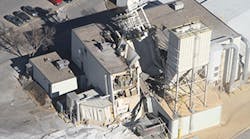OSHA: Overloaded Storage Bins Triggered Collapse that Killed Two Workers in Omaha Feed Plant
OSHA has determined that the weight of nine storage bins on the roof of International Nutrition’s Omaha, Neb., livestock-feed plant triggered the structural collapse that killed two workers and hurt nine others in January.
In its investigation of the Jan. 20 accident, OSHA concludes that a structural failure of the east-side truss caused the bins – which were overloaded with limestone – to tumble three floors into the center of the facility in about 30 seconds.
As a result of the accident, OSHA has hit the company with one willful, one repeat and 11 additional safety violations for failing to protect workers from hazards associated with structural collapse. The agency has proposed penalties of $120,560 and placed the company in its Severe Violator Enforcement Program.
The collapse killed a 53-year-old worker who was cleaning on the second floor and a 47-year-old worker who was performing maintenance when the bins collapsed. The Omaha Fire Department rescued four workers who were trapped in the rubble. The four trapped workers and five other workers were hospitalized with injuries.
“International Nutrition’s decision to overload these bins directly led to the deaths of these two workers and the injuries sustained by nine other employees,” OSHA Administrator Dr. David Michaels said. “Families lost loved ones because International Nutrition did not follow the basic safety procedures that would have prevented this senseless loss of life.”
International Nutrition manufactures a feed supplement using multiple dry ingredients, rice hulls, solulac and limestone – the ingredients that were stored in the nine bins on the roof of the structure, according to OSHA’s investigation.
OSHA issued a repeat violation for the company’s alleged failure to protect workers from hazards associated with using compressed air at greater than the recommended 30 pounds per square inch. OSHA cited the company for the same violation in 2011.
OSHA issued nine serious citations for a range of hazards, such as:
- Combustible dust hazards, including failure to provide proper dust ventilation and failure to follow respiratory protection standards.
- Failing to train workers on confined space requirements, hazard communication and proper operation of powered industrial vehicles.
- Lack of specific lockout/tagout procedures to protect workers operating dangerous machinery.
- Failing to de-energize potential ignition sources when using compressed air for cleaning.
International Nutrition has 15 business days from receipt of the citations to comply or contest the findings.
